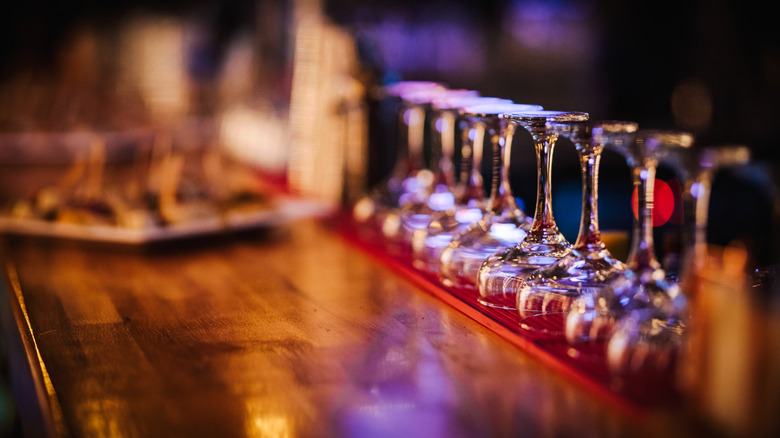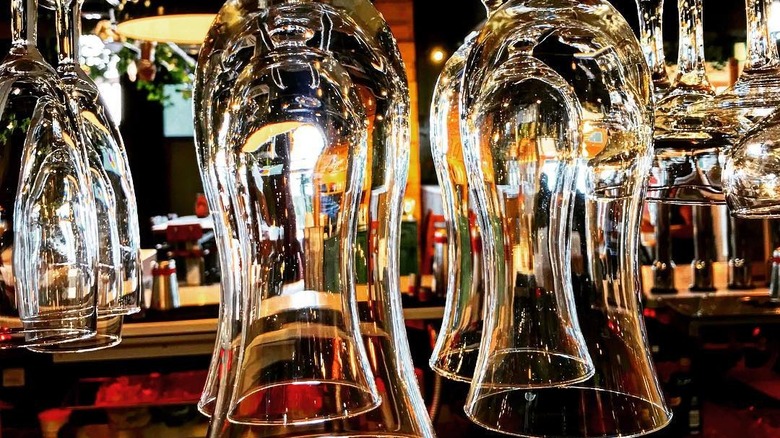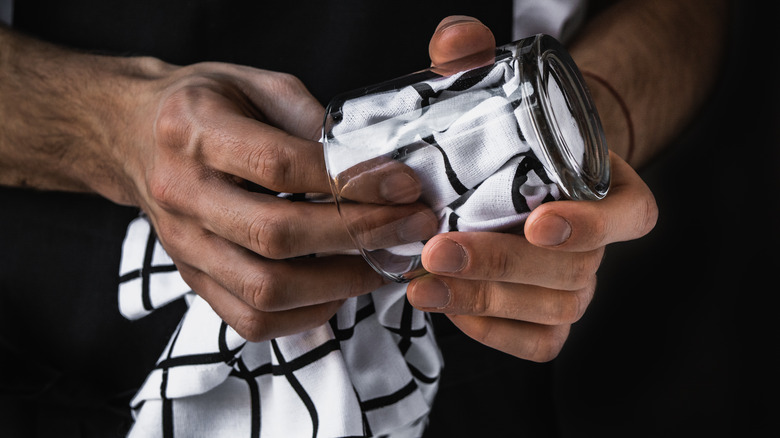The Best Reason To Store Cocktail Glasses Upside Down
It's an argument as old as time (or at least as old as cocktail glasses have been around). Should you store your glassware standing upright or upside down? If you go with the former method, dust and debris can settle in; with the latter, you risk chipping or otherwise damaging the most easily breakable part of the vessel.
Although avoiding breakage is important, the optimal solution still may be to place cocktail glasses upside down. But only if their rims are strong enough to safely handle this type of storage. Not only will you not have to clean dust out of the glasses every time you remove them from a cabinet or from behind your home bar, but cracks and chips will be unlikely too if they are top heavy. However, there are exceptions to this general rule.
The Champagne flute is often cited as a prime example since it has a thinner rim and is more fragile at top, but then again a Champagne flute is not strictly a cocktail glass. It's a wine glass that may also be used to serve Champagne cocktails. The Champagne coupe, or Marie Antoinette, on the other hand, is an accepted cocktail glass that could follow this rule.
The cocktail glasses that should be stored upright
There are many types of true cocktail glasses, but the main qualification for this glassware category is that they are primarily used for, well, cocktails. Makes sense, right? Wine glasses, thus, do not qualify, although they are indeed used for the occasional spritzer or mixed drink. Naturally, it's advised to store extremely delicate or expensive wine glasses — Riedel or fine crystal, for example — in an upright fashion, as that's the safest method to avoid breakage.
Glasses exclusively in the cocktail category include highballs and lowballs (aka rocks glasses), as well as the cordial, coupe, martini, hurricane, margarita, and snifter. With the possible exception of brandy snifters, no cocktail glass varieties are particularly fragile, and each may safely be stored upside down to avoid collecting dust.
However, as a preventative to mustiness or dirty rims, you should ensure that the surface they're being placed atop — whether it's a wood shelf in a cabinet, glass shelving, or another alternative — is cleaned regularly. In many public drinking establishments, this necessity is adhered to by the use of an overhead gantry system, which allows glasses to hang upside down. It's the best of both worlds, in that dust can't collect, nor can rims be dirtied. Gantries can be added to a home bar too, of course, but padded liners are a more common solution; they're also a nice preventative measure against breakage.
Storage and cleaning tips for cocktail glasses
Having a liner or clean surface to store cocktail glasses when they're placed upside down is certainly helpful. But it bears noting that the glasses need to first be clean and dry themselves. Drying is particularly important, as failing to keep glasses clean of moisture can lead to mold or mildew. But the acts of cleaning and polishing merits attention, too. Warm water and a mild dish soap are the basic ingredients needed for the former task, while a dry cloth is best for the latter.
Mugs, whether copper style for a Moscow Mule, or a handled beer stein, should be stored in the same fashion as cocktail glasses. Keep them upside down. As for stacking, certain types of cocktail glasses and mugs respond better to this type of storage than others. In general, the sturdier the glassware, the better it stacks. Rocks glasses, for example, are particularly good with this method. Delicate glassware, by contrast, should not be stacked, and for the same reason they're not stored upside down as they're more susceptible to breaking, or to being nicked or chipped.



